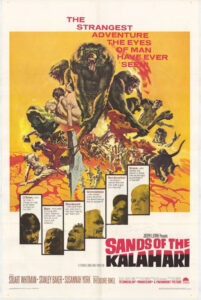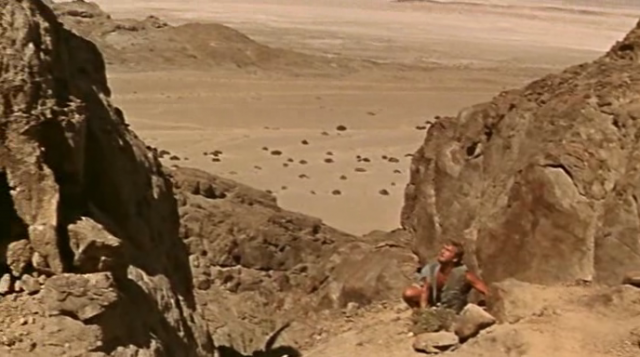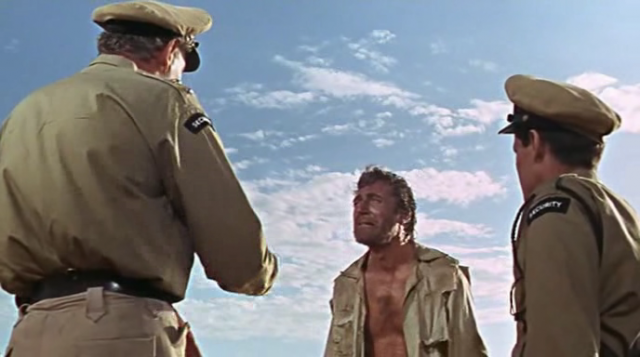“There are five people back there on a black mountain in a pure sand desert. They’re starving to death!”
|

Synopsis:
A diverse group of individuals — including a womanizing pilot (Nigel Davenport), a domineering hunter (Stuart Whitman), a failed mining engineer (Stanley Baker), a beautiful divorcee (Susannah York), a soft-spoken doctor (Theodore Bikel), and a former Nazi officer (Harry Andrews) — struggle to survive in the Kalahari desert after their passenger plane crashes.
|
|
Genres, Themes, Actors, and Directors:
- Africa
- Deserts
- Ensemble Cast
- Harry Andrews Films
- Survival
- Susannah York Films
Review:
Released the same year as Robert Aldrich’s Flight of the Phoenix, writer-director Cy Endfield’s survival tale — based on a novel by William Mulvihill — starts with the same premise of a plane crashing in the Kalahari desert, but moves in an entirely different direction. While the survivors of the Phoenix focus on rebuilding a plane that will lift them out of the area, the motley passengers in Endfield’s film become involved in an existential fight for dominance. Indeed, it’s soon made clear that Endfield is primarily concerned with highlighting the passengers’ devolution into primitive beings (much like the tribes of fang-baring baboons occupying the area), as sexual passions flare — York, conveniently gorgeous, is the only female passenger — and Whitman’s increasingly obvious desire for mastery at any cost (he’s the only one in the group with a gun and ammunition) takes hold. While the plot and dialogue occasionally strain credulity, we’re nonetheless intrigued by the “Lord of the Flies” mentality which emerges, pitting passengers against each other. Fine on-location shooting and an unusual script makes this a worthy adventure flick for those who enjoy tales of survival under extreme circumstances.
Redeeming Qualities and Moments:
- Fine location shooting

- An often tense and gripping script

- The unexpected ending
Must See?
No, but it’s recommended. Listed as a Sleeper and a Personal Recommendation in the back of Peary’s book.
Links:
|
One thought on “Sands of the Kalahari (1965)”
A must.
At IMDb, a surprising number of ffs lament the fact that ‘SOTK’ is currently a somewhat-lost, more-than-somewhat-under-valued gem. I’m going to have to agree. This is not easy material to pull off but I’d say get ready for an intriguing cumulative effect.
Once you get beyond the short opening sequence in which all of the characters are still connected to civilization, the story proper starts from absolute scratch: a small group of people, left in the middle of a desert (how that happens is icky), with little hope of survival – or plot twists. So it does come as a series of surprises when the film branches out in unimaginable ways. Of course, certain elements are expected: five men…one woman…there’s going to be a struggle for conquest there. But, overall, you won’t really know what’s coming – and, throughout, you will most likely place yourself in this situation and wonder what you would do in such dire straits. (I know *I* did.)
I imagine this was a tricky film to cast – but the mix is almost completely successful. There’s just one downside and that’s York. Granted, the role is pretty much that of ‘the girl’ so there’s not a whole lot of depth. Even so, to me York hardly seems to register at all. (Unfortunately, I’ve never felt York had much range and I sense a certain superficial sameness in her performances – with maybe odd exceptions; i.e., her work in ‘They Shoot Horses, Don’t They?’)
I’m certain I saw this when I was young but, boy, this one really is out of circulation and that’s a shame – I think it’s gripping stuff. Yes, it does strain credulity a bit, but not to the degree that you can’t buy into it. The hysterics are kept in careful check. I was with the progression all the way and the story doesn’t seem to suffer from padding of any sort; it’s constructed rather well.
Of particular interest is the film’s climax. Why exactly does Whitman make that ultimate decision? And how exactly does it play out? The last image is a long shot that only adds ambiguity. Personally, I don’t interpret the conclusion as a win-win.